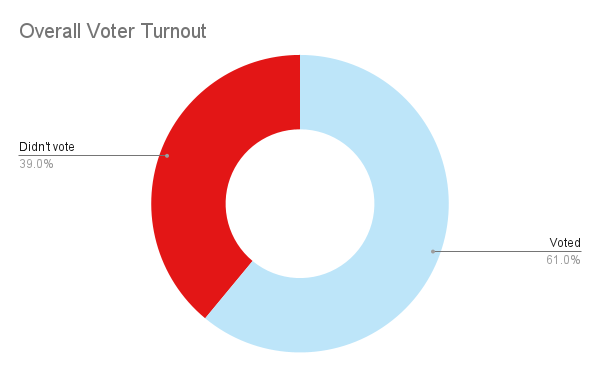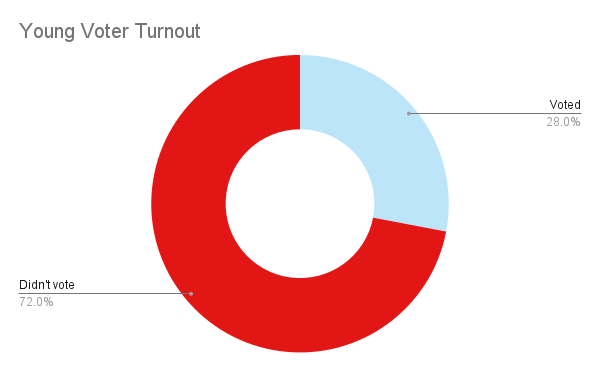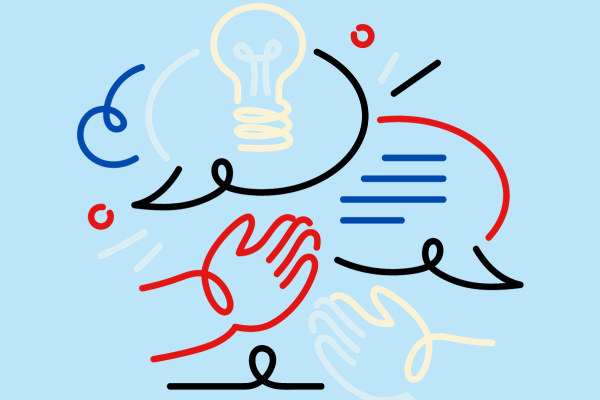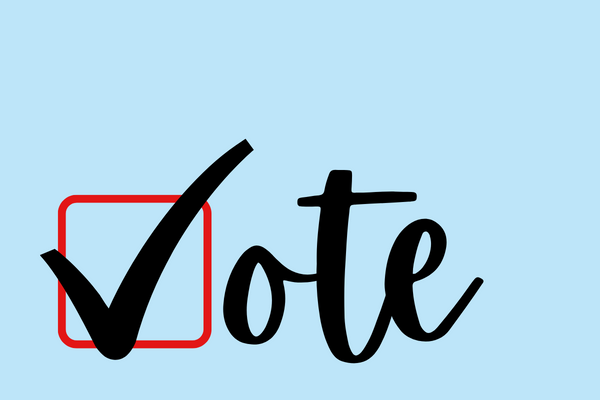I was a sophomore in high school when Utah first began requiring a civics test in order for high school seniors to graduate. I remember my history teacher putting firm pressure on us to study and really understand the material for this test.
“In a way, this is the most important test of your high school career!” He beat that into our heads, explaining to us that most immigrants had to pass a similar test in order to enter the union as a legal United States citizen — granted that one was much longer. All the seniors had to know was the basics of how the constitution and different branches of the government work.
Most everyone passed with flying colors.
But did I go on to use this knowledge? Not really. In fact, it would be another two or three years before I even voted in an election. I found that’s a pretty normal trend.
In 2016, according to the U.S. Census Bureau, 61% of voting-age people in the U.S. reported voting, while only about 28% of young people ages 18-29 reported voting. Rural counties tended to have high voter turnout, but not necessarily from young people.


Normally, elections in Utah take place on November 8. This year, the election has been pushed back to November 21 to accommodate a replacement representative in Congressional District 2. That gives us a little extra time to learn about the election.
Beginning to vote as an 18-year-old can seem overwhelming and easier to just avoid. But understanding how to start voting, why all elections are important and how the election process works can help us to get more civically involved. For me, I needed someone to sit down and explain that all to me one-on-one. That’s what I’m doing for you now.
How to Start Voting
Often the first hurdle you have to jump is knowing how to even start voting. Camille Moore, Garfield County Clerk, is able to help with that.
“I guess the first thing is to make sure that you are registered to vote,” said Camille. She said it can be as easy as selecting “registering to vote” when you get your driver’s license. But you can always go online and register anytime quickly and easily.
Camille said that a really good source is vote.utah.gov. This is a great site to register to vote, find good, reliable information about ballots and even learn about candidates.
“On the bigger elections, the state or the federal ones, on that same site, the candidates have an opportunity to put kind of a biography and what their thoughts are and the reason that they’re running and if they’ve served before,” said Camille. “So that’s a good place to start for the state or federal elections as well.”
Why Local Elections Are Important
Once you are registered and you know about the candidates, Camille’s other advice would be, “It’s really important to make your voice heard and to make sure that you vote.”
State and federal elections are very important, but people often undervalue local elections as a means to vote in leaders who will affect their actual lives. Camille said, “It’s really important to be invested in those races (local elections) because, whether you think so or not, it really does affect your life.”
In fact, it may even affect your life in more ways than the big elections do.
Damon Cann, the political science department head at Utah State University, told Utah Public Radio, “Your city government touched you in the first hours of any given day in very important and significant ways without you even thinking about it, the provision of water, sewer and garbage.”
You may find that local elections are harder to get involved with because news and advertising don’t cover them as much. But in these elections, there’s also less overload of information — especially from outside sources.
“On the local elections, like the town council,” said Camille, “it’s kind of word-of-mouth. There’s not a lot of campaigning, and there’s not a lot of information out there, but there are a lot of people around you that can give you information.”

People close to you can be such a useful source in any election. And Camille added that she and her office are always happy to help.
“You can talk to your parents or your neighbors or your friends, or you can call the clerk’s office or the town offices if you have questions or want more information. And we’re glad to help with anything that we can,” she said.
Understanding the Election Process
Some people get nervous because they worry their vote will be messed with. Nevertheless, Camille assured us we can be confident in the process.
It takes Camille’s office, the court clerks and the offices of the county assessor and the recorder all working together five or six hours to process ballots on election day.
Teams of two go out to pick up the ballot boxes. Then the first step is to check signatures.
“As we get the ballots, we verify the signatures. If there’s a question that a signature doesn’t match, then we contact that person to make sure that they voted that ballot.” The signature is how processors know you were the one who voted. Early ballots are placed in a vault, where no one touches them until election day.
Then the work begins.
The process starts at around 3:00 p.m. There are two groups counting ballots. They do it publicly — in the same room — so everyone is a check on the others.
“We go through and somebody opens the envelope,” Camille said. “Then the next person removes the ballot from the envelope and puts the envelope one way and the ballot the other way so that when we unfold the ballots, we have no idea whose ballots they are.”
The ballots are then run through a machine and counted. Technically until 8:00 p.m., when polls close, anyone could walk in and bring their ballot. Once the polls close, though, the counting is usually done by just after 8:00. The processors then take the memory file and put it on the server.
“We don’t have any idea, anything about the results, until, usually it’s about anywhere from a quarter after 8:00 to 8:30 when we finish with those,” said Camille.
‘We’re Your Neighbors,’ Come In and Ask
“As election officials, as election administrators, we have refined that process to make it efficient and secure,” Ricky Hatch, the Weber County Clerk/Auditor wrote for Vox. “And we want the public to have confidence, because we shop at the same grocery stores, we go to the same church buildings as the people that we serve. We’re your neighbors,” he said. “That’s how we look at it.”
Camille is happy to share more information to make sure locals can be confident in their elections. She even invited anybody to come in and watch.
“We welcome anybody that wants to come in and ask” about the election, said Camille. “And on election day, we’d love somebody, anybody, to come in and see how we process it, so that they can be confident that it’s being done correctly and that the ballots are secret because they really are.”
Voting is a lot easier than I originally imagined, and it’s an amazing process. There are so many people and resources to help you learn how to vote. Go to vote.utah.gov to register to vote, or call the county clerks’ offices for more information. And I’m right alongside you.
Then all that’s left to do is, vote!
– by Abbie Call

Abbie Call – Cannonville/Kirksville, Missouri
Abbie Call is a journalist and editor at The Byway. She graduated in 2022 with a bachelor’s degree in editing and publishing from Brigham Young University. Her favorite topics to write about include anything local, Utah’s megadrought, and mental health and meaning in life. In her free time, she enjoys reading, hanging out with family, quilting and hiking with the dog she’s getting soon — fingers crossed.
Find Abbie on Threads @abbieb.call.

